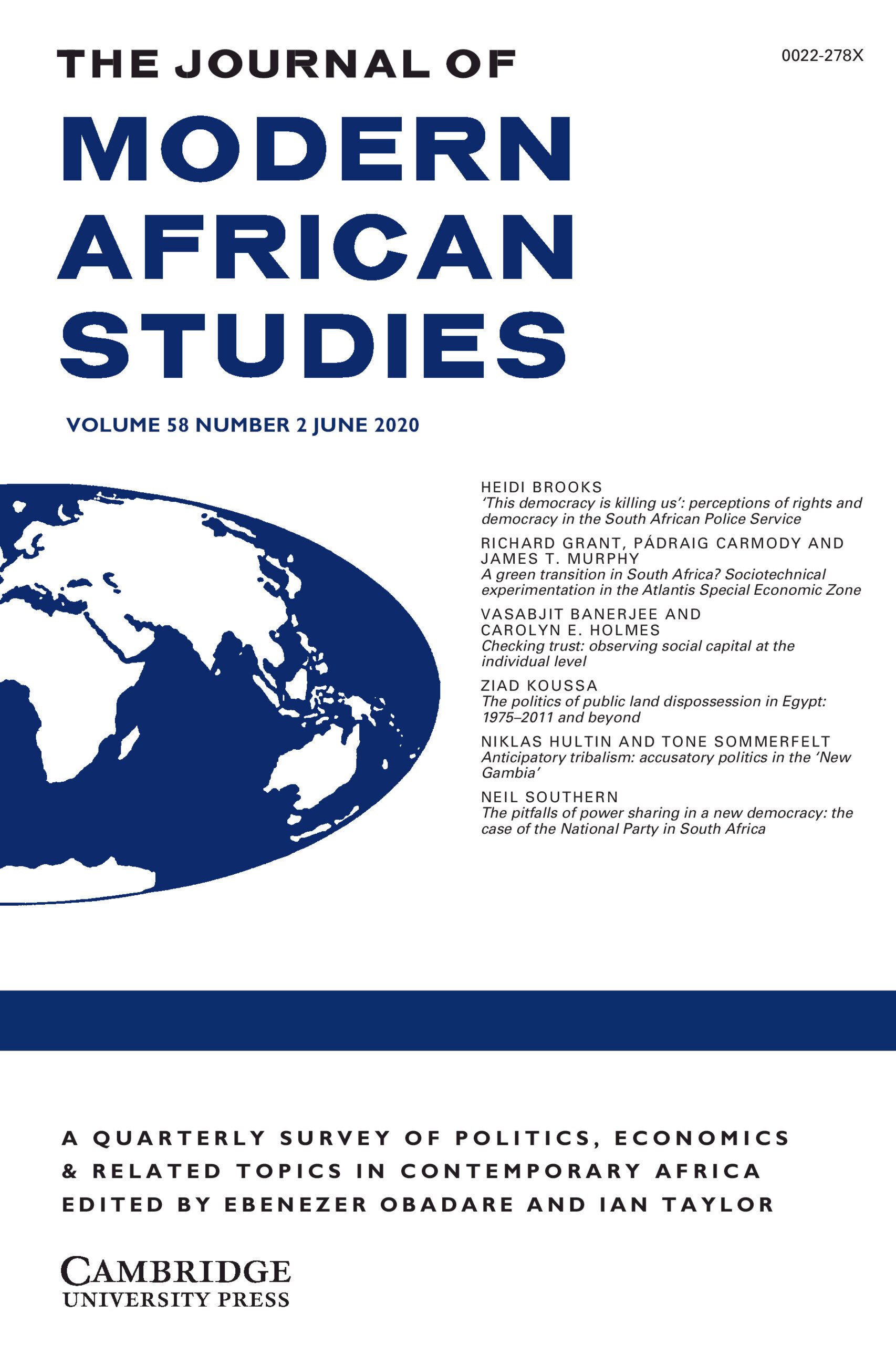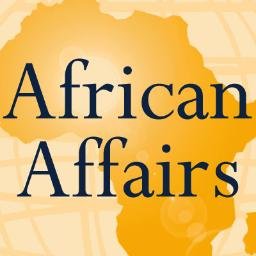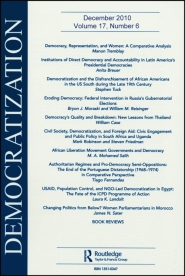Featured Publications
Is ‘white nationalism’, nationalism?
Are ‘white nationalists’ really nationalists? This label is one that right-wing, white activists themselves have chosen, and as such, compels rigorous investigation to avoid simply adopting the preferred nomenclature of these activists and their ambitions. The nation and nationalism are concepts with rich scholarly histories, and this paper seeks to examine the discussion, activities and statements of so-called white nationalists in light of this literature. We argue through a three-fold concept of the nation—based on territoriality, population and symbolic and/or cultural content—that the vision of the political community and ambitions of these activists falls short of the standard of a nation and that their aspirations do not conform to what the literature lays out as nationalism. We argue, therefore, that using the language of ‘white nationalism’ to describe these groups obfuscates and sanitises their motives and lends undue legitimacy to their standing in public discourse.
Victimhood gone viral: portrayals of extra-lethal violence and the solidarity of victims in the case of South African farm violence activists
In her 2013 paper, Lee Ann Fujii proposes the concept of “extra-lethal violence,” which explores the ways that actors use violence over and above a standard of lethality to achieve group goals, like in-group cohesion. This paper, in an extension of Fujii’s work on extra-lethality, looks at the multiple audiences that such violence engages. Utilizing cases of rural violence in South Africa, this paper argues that the brutality of extra lethal violence provides an opportunity for mobilization not only by perpetrating populations, but also victim populations, even when it is infrequent. Organizations representing those who perceive themselves to be connected to the victims of such violence – White, mostly rural, and largely conservative South Africans – stand to benefit from focusing on the brutality of such violence. Victim groups benefit from exaggerating the scope and frequency of extra-lethality of such violence, not least because organizations representing White farmers draw more members and funds in increased threat environments. Activist groups overcome the barrier to mobilization presented by the rarity of extralethal violence by focusing on a small number of cases, and through repetition of the details.
Standing Out and Blending In: Contact-Based Research, Ethics, and Positionality
This article explores the ethical difficulties that arise because of the interaction between fieldwork practitioners and their sites, in terms of the positionality of the researcher. What are the ethics of blending in or of standing out? This question stems from my experience of 12 months of fieldwork in South Africa in two distinct locales and among two different populations, one in which I could “pass” and another in which I was marked as various degrees of “outsider.” Drawing on this fieldwork, as well as an overview of the literature in political science on positionality, I argue that our discipline—because of the way it shapes interactions and research outcomes—must take positionality seriously in ethical training and practice.
Checking trust: observing social capital at the individual level
with Vasabjit Banerjee
Social capital research has measured the concept in two distinct ways: through direct reporting by participants in cross-national surveys and the presence of associative organisations. Both strategies raise difficulties: the former restricts comparability and assumes group stability; the latter relies on literal translation and uses direct questioning. We problematise these approaches and argue that the ratio of ‘check-points’ where individuals are asked to demonstrate adherence to rules, and ‘trust-points’ where such proofs are not required, can better measure social capital. Moreover, the unevenness of social capital between groups is perceptible by ‘fast-lanes’ that differentially treat individuals based on identity. Evidence from a field survey and observational evidence in South Africa is presented.
The Politics of Non-Political Activism in Democratic South Africa
Twenty years after the first democratic elections in South Africa, organizations representing key voting constituencies—youth and the economically marginalized—are becoming major forces of opposition to the ANC-led government while explicitly framing their activities as non-political. They prefer instead to talk in terms of “rights,” and “activism.” Drawing from fieldwork and online publications of three opposition organizations—#RhodesMustFall, Abahlali baseMjondolo and Afriforum— this paper argues that the abandonment of “politics” is more than rhetorical positioning. By framing their actions as non- political these groups engage in a deep-seated critique of the possibilities presented by democratic politics, and a lack of perceived efficacy or legitimacy of institutionalized contestation. Perhaps more importantly, it means that opposition politics are occurring in an environment without institutional incentives for cooperation.
Marikana in Translation: Print Nationalism in South Africa's Multilingual Press
This article attempts to understand how print cultures servicing different language communities fuel nationalisms that are not coterminous with a nation state. In the tradition of scholars like Benedict Anderson, it ex- amines the connections between nationalism and print culture, but with reference to a single important event: violence at the Marikana mine. These events constituted the largest act of lethal force against civilians in the post-apartheid era. The South African press in three languages – Afrikaans, isiZulu, and English – covered the violence that erupted at the Lonmin mine in Marikana in mid-August 2012. Using original transla- tions of daily newspapers and quantitative content analysis, the article assesses the differences among the various print media outlets covering the event. It finds that news coverage varied significantly according to the lan- guage medium in three ways: attribution of action, portrayal of sympathy and blame, and inclusion of political and economic coverage in the after- math of the violence. These variations in coverage coincided with differ- ences between reading publics divided by race, class, and location. The article argues that the English-language bias of most media analysis misses key points of contestation that occur in different media, both within South Africa, and throughout the post-colonial world.
Conventions, Courts, and Communities: Gender Equity, CEDAW and Religious Personal Law in India
The Convention for the Elimination of All Forms of Discrimination Against Women is central in outlining the gendered dimensions of human rights. India ratified this treaty with the reservation that it would be complied with only in accordance with the religious personal law. This article will examine the ways in which the convention interfaces with religious personal law, and the efficacy of the convention in both top-down and bottom-up reform of religious personal laws, as well as secular laws.
Icons of the Old Regime: Challenging South African Public Memory Strategies in #RhodesMustFall
With Melanie Loehwing
Students engaged in the spring 2015 protests on the University of Cape Town campus demanded the removal of the statue of Cecil John Rhodes, prompting renewed debate over the appropriate treatment of colonial and apartheid-era statuary in contemporary South African public spaces. While the students’ protests were often dismissed in public discourse and media coverage as misguided or misinformed, this article situates them in the broader context of symbolic reparations central to the transition to multiracial democracy. We introduce the terms ‘monologic commemoration’ and ‘multiplicative commemoration’ to describe the two dominant phases of South African public memory initiatives during and after apartheid. Monologic commemoration promotes a singular historical narrative of national identity and heroic leadership, whereas multiplicative commemoration requires the representation of as many diverse experiences and viewpoints as possible. We examine the #RhodesMustFall campaign as an eruption of discontent with both the monologic and multiplicative approaches, potentially signaling a 20 new ‘post-transitional’ phase of South African public culture.
Winning Is Not Everything: Public Perceptions of Losers and Non-Voters in South Africa
With Timothy S. Rich
Which factor – being an electoral loser or being a non-voter – has a greater negative influence on perceptions of democratic institutions in South Africa? Employing four waves of Afrobarometer data, this analysis finds that both negatively correlate with evaluations of democracy and parliament in particular, with weaker results after control- ling for demographic and geographic factors. However, little consistency emerges as to which has the greater negative influence on perceptions. Furthermore, disaggregating non-voters finds that those preferring parties that lost have the lowest evaluations overall.
Framing the Democratic Narrative: Local and National Voting Patterns in South Africa
With Brian Shoup
While it is sometimes characterised as a dominant party, South Africa’s African National Congress (ANC) has failed to demonstrate consistent dominance in provincial and municipal elections. It is argued that this incongruence is related to the ways in which the national political imaginary is successfully (and unsuccessfully) framed by ANC elites who have managed to make the story of the ANC largely inseparable from the national character of the post-apartheid state. At the local and municipal levels, The ability of the ANC to frame this inseparability is hobbled by more policy-oriented frames as well as the institutional character of South Africa’s constituent–legislator relationships.
Recrafting the National Imaginary and the New "Vanguardism"
With Brian Shoup
An opportunity exists to assess the limitations in building long-term peace in post-conflict states, particularly given the extent to which negotiated settlements incorporate demands for democratic mechanisms. By assessing how post-conflict governments construct new majorities through policy tools as well as assessing how they are constrained by the structural realities of negotiated settlements, we gain some purchase on the reasons why some post-conflict state projects succeed while others fail. This has potentially transformative implications for our understanding of how social contracts, and their attendant issues of consent, dissent, and legitimacy, operate in the modern world and the ways they impact such critical discussions as democratic transition, post-conflict reconciliation, and nation-building. We use the case of post-apartheid South Africa to analyse how post-conflict states are limited in terms of forging social contracts among citizens and between citizens and governments. Of specific interest is the way that post- conflict social contracting compels nation-builders to eschew the uncertainties of viable electoral democracy in favour of dominant party regimes or electoral authoritarianism. We suggest that this tension is less a result of pecuniary interest on the part of nation-builders and more a consequence of the imperfections of the modern social contracting process.










